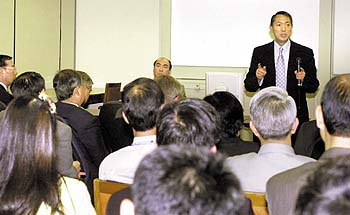Commanders briefed on frontline improvements
Formation commanders were briefed on new measures to help better frontline safety and coverage, on April 19.
Director of Operations Ng Wai-kit, Assistant Commissioner (Operations) Cheung Chi-sum and Acting Assistant Commissioner (Support) Lee Wai-lam addressed a gathering of Regional, District and Divisional Commanders at Arsenal House, Police Headquarters.
The improvement measures outlined were based on three major areas of concern.
These were: Sufficiency of manpower in beat coverage; response to calls by beat duties; and, the safety of frontline officers. Suggested improvements include: Enhancement to beat patrol policy; more Police Tactical Unit support; a Panda Car pilot scheme; guidelines on handling reports received by Duty Officers, and the deployment of resources.
The issues were discussed in four parts, looking at: The findings of the Beat Coverage and Workload Survey in selected formations; Common Misconceptions about the Enhanced Productivity Programme, including Station Amalgamations; Improvement Measures, and an open forum was also held where commanders voiced their opinions.
"On March 14, we lost a colleague who was brutally killed when assigned to investigate a noise complaint. Frontline officers and the public have since given a lot of suggestions, opinions and even grievances all revolving around the three major areas of concern," Mr Ng said.
"Although these areas have long received the attention of PHQ, particularly the Operations and Support Wings, we have carefully examined this valuable feedback and identified ways to improve the situation."
The three speakers revealed the findings of the survey and explained in some depth improvements already introduced, and those in the pipeline.
"Generally speaking the survey reflects an equitable distribution of manpower and that the strength of frontline officers is above the establishment. However, the findings also indicate a fluctuation in workload between beats and during different times of the day," said Mr Ng.
"This particular issue could best be dealt with by flexible deployment ensuring that sufficient resources are given to busy beats at the time when they are most needed."
Mr Cheung said: "Tactical deployment of PTU should also be considered by commanders in addressing this issue. They can back up beat duties when risk factors are detected. They can also respond to 999 calls of a serious nature or during busy periods so long as their ability to reform quickly as a platoon is maintained."
Mr Lee added: "Another suggested measure is the Panda Car currently piloted in two divisions in New Territories North. Two self-driven officers in a marked police car will be able to respond quickly to reports in remote locations, cover a large area and provide better support."
Mr Ng said the improved measures were generally applicable to most formations and could help solve any manpower problems and ensure the safety of frontline officers on the beat.
"Of course each formation is unique and may have different circumstances, so formation commanders are encouraged to do all they can to address the specific needs of their own formations," he said.
"Obviously double beats are not normally needed on station guard and busy ferry concourse and bus terminus duties, but where there may be a risk factor involved, such as patrolling a remote area or communications blackspot, formation commanders need to consider whether the beat should be paired up.
"Beat officers themselves and supervisory officers should also be reminded of risk factors and be alert when responding or dispatching officers to a report, particularly when the identity of the informant cannot be confirmed. This should apply to cases even of a minor nature. We must increase the alertness of every officer. Safety is of paramount importance."
Mr Ng called on the commanders to brief their own formations on the measures so every frontline officer had a clear understanding of the situation, the improvements and their purposes. The recommendations would be reviewed in six months.
"These measures seem simple, but they are practical and focus at areas where everyone is concerned - this is just the start."
| Frontline formalities: D OPS Ng Wai-kit briefs formation commanders at PHQ |
